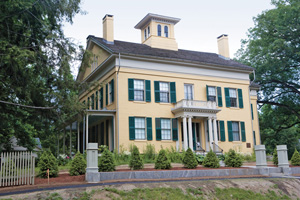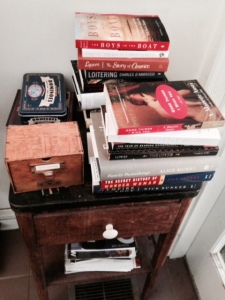Not this
Let’s get the negative out of the way: Julian Fellowes’s Belgravia. This is a serialized novel from the creator of Downton Abbey – I heard an NPR interview with him about it, I like historical fiction, I figured I’d give it a go. I also like to check out innovative or sl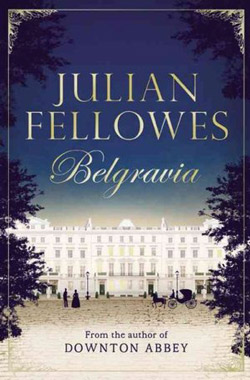 ightly different modes of storytelling – though the serial format is a bit of a throwback, too, it’s one that’s rarely seen anymore.
ightly different modes of storytelling – though the serial format is a bit of a throwback, too, it’s one that’s rarely seen anymore.
First, the app. It sucked. You had to sign in every time, it never remembered where you were, simply turning pages was far glitchier on the same device than it was in the Kindle or iBooks apps. You had to reload everything every time. New chapters didn’t appear until the day after they were promised. Overall, not pleasant.
Second, the content. I listened to the first (free) chapter on audio. Hiring the actress Juliet Stevenson to narrate the audiobook was the best decision anyone made regarding this enterprise. I liked it enough, and was feeling supportive enough about the whole idea, that I invested in $14 to get the rest of the book, delivered in weekly installments.
I started reading the next few chapters and … see page-turning glitchiness complaints, above. Also, it soon became clear that while Fellowes may be a supremely talented creator of high-end soap operas, he’s not a great writer, even in the context of historical romance. I read enough of those to know. This wasn’t, strictly, a romance — I’d call it more of a melodrama. But it was insanely predictable and two-dimensional even within those standards.
Which made me very surprised to read in Entertainment Weekly an interview about his latest project, Julian Fellowes Presents Doctor Thorne (for future reference: avoid projects where the creator’s name appears in the title). Fellowes said this: “Trollope is one of my favorite writers of all time. His emotional position is very similar to my own in that nobody is all good or all bad.”
And my immediate reaction was, what the hell are you talking about? Your villains are so bad they practically twirl their mustaches and the good guys are so good you almost want to smack them. I was glad when I saw that the good critics at Slate had also noted this odd contradiction, as Laura Miller wrote Fellowes “professes to love Trollope and to value the “moral complexity” of his characters, then proceeds to strip all such complexity out of their portrayal.” (She credits the TV critic Willa Paskin though Paskin’s review is kinder toward the TV show than Miller’s — enough that I might give it a try since we have Amazon Prime anyway and I’m curious to see Fellowes-as-Hitchcock. Or maybe I should just, you know, read Trollope.)
I went back to listening to the chapters on audio and found it improved considerable – thanks, Juliet Stevenson! Maybe Fellowes just writes better for dramatic presentation than old-fashioned reading anyway. Plus no more glitchy page turning. There’s nothing that makes you feel stupider than repeatedly swiping and tapping your iPad so you can read the next page of a book you don’t like that much that you paid real money for. Was it a waste of time? Kind of, though once I’d plunked down that $14 I was going to see this melodrama through to the melodramatic finale. I think that’s what I’m most annoyed about – if I’d gotten this book from the library or even paid a dollar or two on the Kindle, I would be OK with it. But $14 is real money, bookwise, and I feel like I fell for a British-accented, elaborately costumed scam.
And I didn’t even watch Downton Abbey.
Read these!
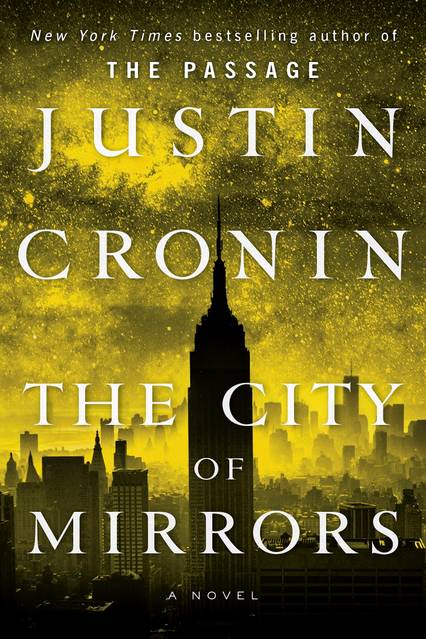 Enough with the negative. Let’s move on to gushing about highly hyped entertainment reading that delivered on its hype: The City of Mirrors by Justin Cronin. This is the third in the dystopian trilogy that started with The Passage, back in 2010. I was working at the library then and jumped on the train. Loved the first book, liked the second enough to get through it all (these books are loooooong) and I was damned sure going to finish the last.
Enough with the negative. Let’s move on to gushing about highly hyped entertainment reading that delivered on its hype: The City of Mirrors by Justin Cronin. This is the third in the dystopian trilogy that started with The Passage, back in 2010. I was working at the library then and jumped on the train. Loved the first book, liked the second enough to get through it all (these books are loooooong) and I was damned sure going to finish the last.
It had been awhile (four years!) since The Twelve, though, so I was a little worried about what I remembered about the plot. And it’s not like you’re going to plow through a thousand-plus pages AGAIN to refresh yourself. So I used the same method I do on the rare occasions that George R.R. Martin produces a book – I read the plot summaries of previous installments on Wikipedia. Plus, Cronin used a future-history-of-the-chronicled-events plot device that reminded me of the events of book 2. And we were off.
I loved it. I spent the entire weekend wallowing around in that book – not rushing through thought it was a page-turner, not savoring though I was perfectly happy hanging out in that world. It wasn’t one of those giant tomes where you’re like, “This thing could easily lose a couple hundred pages and no one would notice.” The extended backstory was interesting and, as it happens, a fun return to the 1990s and a refreshing break from the dystopic present of the novels. I liked it at least as much as the first novel and much better than the second. So I was very grateful to my local library for buying several copies and wish I could take that $14 back from Julian Fellowes and give it to Justin Cronin.
My local library was also kind enough to supply a copy of Eligible by Curtis Sittenfeld. This update of Pride and Prejudice (should that be Jane Austen’s Pride and Prejudice?) got a rave in the New York Times Book Review so I figured I’d like it. 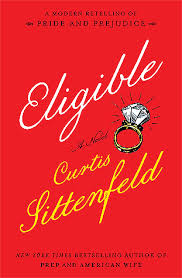 And I liked the earlier installment I’d read in this series of contemporary Austen updates. It was also the perfect antidote – or remedy is maybe a better word — to my City of Mirrors book hangover. It’s not like I wanted to live in Justin Cronin’s created world — but I had been so intensely immersed in it that it was hard to focus on minor things like my life and my job. Eligible is a frothy social comedy in the best sense – and it was just so much fun to both learn about these new versions of Bennets and Bingleys and Darcys – as well as watch them reach the happy endings I knew were in store. My only complaint about Joanna Trollope’s version of Sense & Sensibility were that I felt she did some contortions to fit the plot into the 21st century. Sittenfeld’s use of a Bachelor-like reality show (the titular “Eligible”) was brilliant.
And I liked the earlier installment I’d read in this series of contemporary Austen updates. It was also the perfect antidote – or remedy is maybe a better word — to my City of Mirrors book hangover. It’s not like I wanted to live in Justin Cronin’s created world — but I had been so intensely immersed in it that it was hard to focus on minor things like my life and my job. Eligible is a frothy social comedy in the best sense – and it was just so much fun to both learn about these new versions of Bennets and Bingleys and Darcys – as well as watch them reach the happy endings I knew were in store. My only complaint about Joanna Trollope’s version of Sense & Sensibility were that I felt she did some contortions to fit the plot into the 21st century. Sittenfeld’s use of a Bachelor-like reality show (the titular “Eligible”) was brilliant.
I loved how she adapted and changed the characters’ roles and ages but managed to hold onto the essentials – Liz is smart but sometimes a little too sharp, Darcy is uptight but honorable, Jasper Wick (ie Wickham) is a charming douchebag, Mrs. Bennett is pretty awful but hey, she’s your mom and Mr. Bennett is smart and funny but disastrously disengaged. Though my favorite change might be the most radical – Kathy DeBourgh as a formidable Gloria Steinem-like feminist icon.
I did gallop through this one – really, really short chapters made me feel like I was supposed to be doing that – but I was happy to do so. And immediately went to the library and got the two Austen updates I hadn’t read yet, Northanger Abbey by Val McDermid and Emma by Alexander McCall Smith. I really can’t wait to see who gets Persuasion.
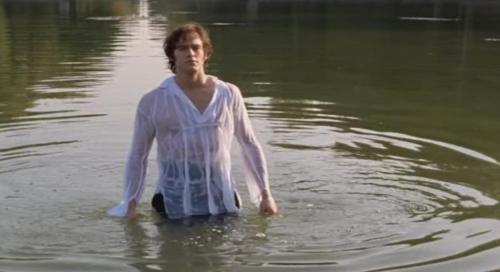
Just because.
So … five stars to Justin Cronin, Curtis Sittenfeld, their editors and publishers and of course my local library.
Two stars to Julian Fellowes – mostly for trying something a little bit out of the norm. Stick to screenwriting, dude, and next time hire a much better app developer. Though I will check out Downton Abbey one of these years.
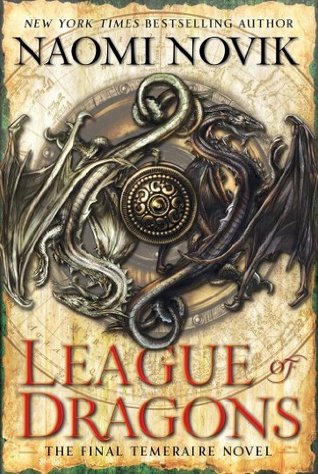 But in Naomi Novik’s Temeraire series, dragons are characters and that’s the genius of the series. She just wrapped it up with League of Dragons, and she did it well. Fortunately there are nine books in all so if you’re feeling bereft about the end of the series you can just start from the beginning again, with His Majesty’s Dragon.
But in Naomi Novik’s Temeraire series, dragons are characters and that’s the genius of the series. She just wrapped it up with League of Dragons, and she did it well. Fortunately there are nine books in all so if you’re feeling bereft about the end of the series you can just start from the beginning again, with His Majesty’s Dragon.
 ightly different modes of storytelling – though the serial format is a bit of a throwback, too, it’s one that’s rarely seen anymore.
ightly different modes of storytelling – though the serial format is a bit of a throwback, too, it’s one that’s rarely seen anymore. Enough with the negative. Let’s move on to gushing about highly hyped entertainment reading that delivered on its hype:
Enough with the negative. Let’s move on to gushing about highly hyped entertainment reading that delivered on its hype:  And
And 
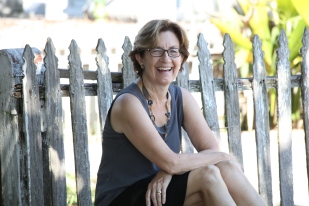
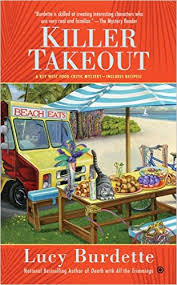 joyed her book, which is set in the run-up to Fantasy Fest … with a hurricane bearing down. It didn’t even give me too much of a Wilma flashback. I especially admired how she addressed the tensions among Conchs, yearround locals and snowbird socialites. That’s a large — and growing — aspect of life down here, at least from my perspective.
joyed her book, which is set in the run-up to Fantasy Fest … with a hurricane bearing down. It didn’t even give me too much of a Wilma flashback. I especially admired how she addressed the tensions among Conchs, yearround locals and snowbird socialites. That’s a large — and growing — aspect of life down here, at least from my perspective.
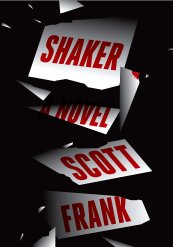 cellent local library already had a copy. Frank is a screenwriter and this is a first novel – my opinion has been that screenwriters write excellent thrillers and crime fiction because they know how to move a plot along, as well as how to write dialogue. This one bolsters my theory and is also an excellent option for people who are jonesing for Elmore Leonard now that the master has left us. Frank wrote the screenplays for Out of Sight and Get Shorty and it shows, though he doesn’t really have Leonard’s funny vein. He’s not trying to be funny, though, so that’s cool.
cellent local library already had a copy. Frank is a screenwriter and this is a first novel – my opinion has been that screenwriters write excellent thrillers and crime fiction because they know how to move a plot along, as well as how to write dialogue. This one bolsters my theory and is also an excellent option for people who are jonesing for Elmore Leonard now that the master has left us. Frank wrote the screenplays for Out of Sight and Get Shorty and it shows, though he doesn’t really have Leonard’s funny vein. He’s not trying to be funny, though, so that’s cool.